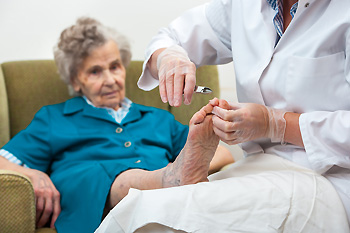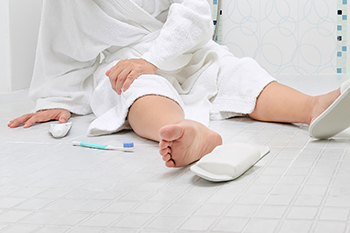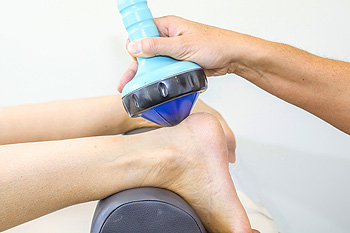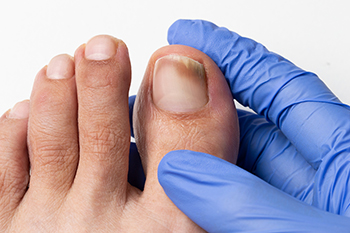

Foot problems in the elderly are a major concern because they contribute to balance and gait issues and lead to an increasing risk of falls. Seniors are physically weaker, have more mobility problems, and have reduced concentration than those that are younger. Their foot problems result from gait issues, poor posture, weakness of the bones, poor blood circulation, reduced sensation, inactivity, and fatigue. Since older people cannot always feel when they sustain an injury to their feet, they may develop wounds that are left untreated. Older people most often suffer from corns and calluses, bunions, foot fungus, hammertoe, toenail problems, and plantar fasciitis. If you are elderly or take care of one in this age group, it is suggested that you include a podiatrist on the health care team. If you, or the one you care for, notice ongoing problems or pain with feet and falling, a podiatrist can assess the situation and provide treatment.
Proper foot care is something many older adults forget to consider. If you have any concerns about your feet and ankles, contact the podiatrists from The Foot & Ankle Center of New Jersey. Our doctors can provide the care you need to keep you pain-free and on your feet.
The Elderly and Their Feet
As we age we start to notice many changes in our body, but the elder population may not notice them right away. Medical conditions may prevent the elderly to take notice of their foot health right away. Poor vision is a lead contributor to not taking action for the elderly.
Common Conditions
Susceptible Infections
Diabetes and poor circulation can cause general loss of sensitivity over the years, turning a simple cut into a serious issue.
If you have any questions please feel free to contact our office located in Paramus, NJ . We offer the newest diagnostic and treatment technologies for all your foot and ankle needs.

If you are among the elderly, you are at an increased risk of falling. Improving your balance and becoming more aware of your body and how it is moving through exercise can help you prevent falls. If your podiatrist approves, you can try simple balance exercises at home such as the single leg stance with variations. These exercises all have a resting position where you stand with your legs slightly apart while supporting yourself behind a chair or table. First, lift one leg up to the side about 6 inches and hold for 10 seconds. Do 5-10 reps on each leg. Now, go back to the resting position, but this time bend your right knee and lift your leg about 6 inches off of the floor and hold for 10 seconds before switching to the other leg. Once again, return to the resting position keeping your knee straight. Lift one leg behind you and hold for 10 seconds, and repeat on the other leg. These single-leg stance exercises can be done up to three times daily and once you feel ready with your podiatrist's approval, you can try them with your eyes closed to improve your balance even more. Consult with your podiatrist for more balance exercises and to receive a fall risk assessment.
Preventing falls among the elderly is very important. If you are older and have fallen or fear that you are prone to falling, consult with the podiatrists from The Foot & Ankle Center of New Jersey. Our doctors will assess your condition and provide you with quality advice and care.
Every 11 seconds, an elderly American is being treated in an emergency room for a fall related injury. Falls are the leading cause of head and hip injuries for those 65 and older. Due to decreases in strength, balance, senses, and lack of awareness, elderly persons are very susceptible to falling. Thankfully, there are a number of things older persons can do to prevent falls.
How to Prevent Falls
Some effective methods that older persons can do to prevent falls include:
Falling can be a traumatic and embarrassing experience for elderly persons; this can make them less willing to leave the house, and less willing to talk to someone about their fears of falling. Doing such things, however, will increase the likelihood of tripping or losing one’s balance. Knowing the causes of falling and how to prevent them is the best way to mitigate the risk of serious injury.
If you have any questions, please feel free to contact our office located in Paramus, NJ . We offer the newest diagnostic and treatment technologies for all your foot care needs.

Extracorporeal Shock Wave Therapy (ESWT) is a non-invasive treatment for many painful and chronic conditions such as plantar fasciitis and Achilles tendonitis. This type of treatment is performed outside the body (extracorporeally) and works by targeting the damaged tissue or bone with acoustic shock waves using ultrasound to precisely pinpoint the area. The acoustic sound waves create a controlled reaction within the tissue that ultimately regenerates cells and blood vessels, resulting in repairing the tissue and relieving pain. Unlike surgery, ESWT requires no prolonged recovery time. If you are suffering from plantar fasciitis or a painful Achilles tendon issue, you might benefit from consulting with a podiatrist to discuss whether you are a good candidate for ESWT.
Shockwave therapy is a treatment commonly used to treat various injuries and conditions, particularly plantar fasciitis in the feet. To learn more, consult with the podiatrists from The Foot & Ankle Center of New Jersey. Our doctors can provide the care you need to keep you pain-free and on your feet.
Shockwave Therapy
Shockwave therapy is a new treatment option designed to treat bone conditions such as tennis elbow, shoulder pain, and others. Shockwave therapy uses high intensity sound waves that are directed to the affected tissues of the body with pinpoint accuracy. The effects are very beneficial, leading to a production of collagen fibers, eliminating inflammation.
Who Benefits from Shockwave?
Shockwave is recommended for patients suffering from heel pain and associated problems. Heel pain is a common condition which can be caused by obesity, overexertion, and spending a substantial amount of time on hard floors with your feet exposed and unsupported.
Fast and Easy
The therapy is actually a simple process that can leave patients feeling better the very next day. Shockwave therapy is not as dramatic as it sounds. It enables more blood flow to effected areas, addressing the source of the problem and allowing treatment to last for a long time.
Treatment & Recovery Time
Shockwave treatment will enable your feet to recover quickly. This is especially important since surgery is not required. It is cost effective and does not require the use of anesthesia. This treatment is a better option to surgery, since it is proven safe.
If you have any questions, please feel free to contact our office located in Paramus, NJ . We offer the newest diagnostic and treatment technologies for all your foot and ankle needs.

Toenails protect the toes. They are made of keratin, which makes them tough and resilient for the daily wear and tear they endure. Various things, including friction from ill-fitting shoes, level of physical activity, some pre-existing health conditions, temperature, and moisture, can affect toenails. Pain, itching, and discoloration are some of the signs of toenail problems. Toenail fungus, or onychomycosis, is a common toenail problem. It is more apt to affect older people, with half of all people over 70 developing a toenail fungal infection. It can also impact those who walk barefoot in public areas, like pool areas or locker rooms (with warm, dark, and damp conditions), and those who get sweaty feet or have diabetes. As the infection makes its way deeper into the toenail, the nail becomes discolored and thickened. The nail may crumble and become jagged at the edge. The infection can spread to other toenails and surrounding skin. If it oozes a foul-smelling pus, the infection is worse. It is important to see a podiatrist if you feel you have toenail fungus or any other troubling issues with your toenails. They can properly diagnose the problem and discern how it should be treated.
If left untreated, toenail fungus may spread to other toenails, skin, or even fingernails. If you suspect you have toenail fungus it is important to seek treatment right away. For more information about treatment, contact the podiatrists of The Foot & Ankle Center of New Jersey. Our doctors can provide the care you need to keep you pain-free and on your feet.
Symptoms
Treatment
If self-care strategies and over-the-counter medications does not help your fungus, your podiatrist may give you a prescription drug instead. Even if you find relief from your toenail fungus symptoms, you may experience a repeat infection in the future.
Prevention
In order to prevent getting toenail fungus in the future, you should always make sure to wash your feet with soap and water. After washing, it is important to dry your feet thoroughly especially in between the toes. When trimming your toenails, be sure to trim straight across instead of in a rounded shape. It is crucial not to cover up discolored nails with nail polish because that will prevent your nail from being able to “breathe”.
In some cases, surgical procedure may be needed to remove the toenail fungus. Consult with your podiatrist about the best treatment options for your case of toenail fungus.
If you have any questions, please feel free to contact our office located in Paramus, NJ . We offer the newest diagnostic and treatment technologies for all your foot care needs.